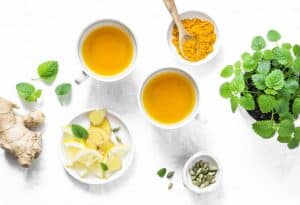You are what you eat: how anti-inflammatory diets can help with pain
November 12, 2019

Some chronic conditions may cause inflammation in your body. While medication and other treatments are important, it may be that adopting an anti-inflammatory diet will be beneficial as well. Changing the way you eat will probably not be a magic cure, but when included as part of your pain management plan, it can definitely help.
Anti-inflammatory diets are typically considered very healthy, so even if the effects on your condition are minimal, it will improve your overall health and well-being. It may also help you lose weight, which can be a huge factor in alleviating your pain.
What is inflammation?
Inflammation is a way in which your body can protect itself from infection, illness, or injury. Classic signs of short-term (acute) inflammation include redness, pain, heat, and swelling. However, with long-term (chronic) inflammation, you may have no obvious symptoms. This can lead to various problems within your body, or it can make already existing conditions worse.
Eating unhealthy foods, drinking alcohol or sugary beverages, and engaging in little physical activity are all factors associated with increased inflammation. Many of these factors are also associated with increased pain.
To reduce inflammation, it’s important to eat fewer inflammatory foods and more anti-inflammatory foods.
Foods to avoid with an anti-inflammatory diet
Minimize or cut the following out completely:
- Sweets, cakes, cookies, soda — These types of foods are full of sugar and have few, if any, nutrients. Eating or drinking too much of these items can lead to weight gain, high blood sugar, and high cholesterol, which are all related to inflammation.
- High-fat and processed red meat — These have a lot of saturated fat, which can cause inflammation if you get more than a small amount each day.
- Butter, whole milk, cheese — Saturated fat is the main problem here too.
- Fried foods — There’s not really a way to make fried food healthy, no matter what kind of oil you use. These are a huge culprit in increasing inflammation.
- Coffee creamers, margarine, other products with trans fats — Trans fats (often labeled as “partially hydrogenated oils”) raise LDL cholesterol, which causes inflammation.
- Wheat, rye, barley — Gluten is the main issue with these foods. Anyone with celiac disease should avoid gluten completely. For those who do not have this condition, most research suggests that whole grains are beneficial.
Foods to eat with an anti-inflammatory diet
Your anti-inflammatory diet should include a healthy balance of protein, carbs, and fat at each meal. It’s also important to meet your body’s needs for vitamins, minerals, fiber, and water. We recommend that you work with your doctor at Southside Pain and/or a dietician on a plan that is tailored to you. Again, unless you have a specific condition that suggests otherwise, adding in more of these foods to your diet will always be beneficial.
Here are some anti-inflammatory foods your plan may include:
- Vegetables — broccoli, kale, Brussels sprouts, cabbage, cauliflower, peppers, etc.
- Fruit — All fruit, especially dark colored berries
- High-fat fruits — avocados and olives
- Healthy fats — olive oil, coconut oil, avocado oil
- Fatty fish — salmon, sardines, herring, mackerel, anchovies
- Nuts — almonds and other nuts
- Chocolate — dark chocolate
- Spices — turmeric, fenugreek, cinnamon, etc.
- Tea — green tea
- Red wine — up to 5 ounces of red wine per day for women and 10 ounces per day for men
Tips for success when putting an anti-inflammatory diet into practice
- With each meal, focus on filling up at least half your plate with fruits and vegetables. Include them with every meal, and eat more fruits and vegetables in a variety of colors. Remember that all forms of fruits and vegetables count: fresh, frozen, canned, and dried. Be sure to choose options with no added sugar and lower sodium.
- With this diet change, it’s very important to get plenty of sleep. The quality and quantity of sleep you get can have an impact on inflammation.
- Similarly, it’s important to be active on a regular basis, even if that means simple walking. Any physical activity that has been approved by your doctor will be beneficial, and aim for 30 to 60 minutes a day, most days of the week.
If you’d like to learn more about anti-inflammatory diets, or if you think making this change might be right for you, talk to your doctor at Southside Pain. We can help advise you and point you in the right direction of dietitians who may be able to help further.
Southside Pain Specialists is your one-stop shop for pain management
With a multitude of pain relief options tailored to your specific needs, Southside Pain Specialists follow the standards of the American Society of Interventional Pain Physicians, The American Board of Pain Medicine and the International Spinal Injection Society and works hard to provide patients comprehensive, caring pain relief when they need it most. Check out our website or contact us today at 205.332.3155 to learn more.
